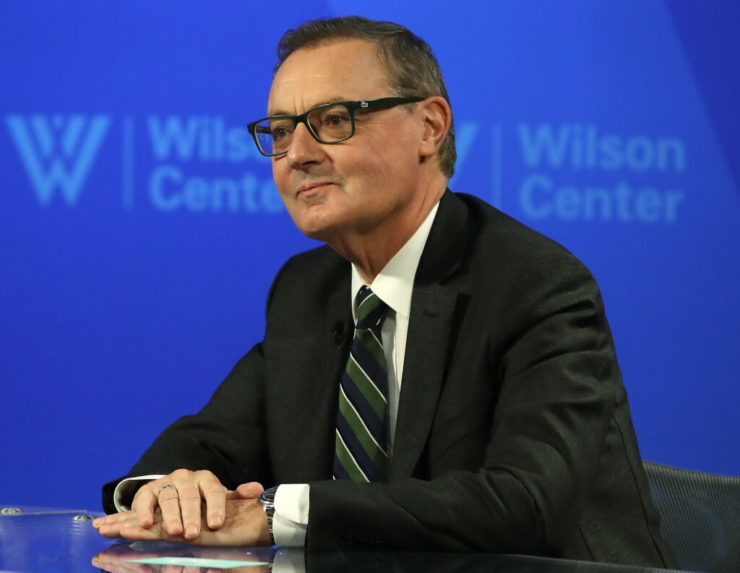
On November 28, David O’Sullivan, EU Special Envoy for Sanctions, visited Kazakhstan. He also spent November 29-30 in Tashkent, as part of a visit to Uzbekistan that took place immediately after his departure from Astana.
The publicly announced purpose of the two visits was to “discuss the prospects for trade and economic cooperation with the European Union.” In fact, the envoy had a conversation with the leadership of the two countries on the quality of their compliance with the sanctions regime against Russia.
It is worth noting that the visits of this high-ranking gentleman to the largest countries of Central Asia are becoming quite regular: for example, he already visited Kazakhstan and Uzbekistan in April this year, and discussed the same range of issues. Also, in March of this year, he visited Bishkek.
The new visit suspiciously coincides with the extension of Uzbekistan’s (and a number of other countries) membership in the ESP+ system of trade preferences until 2027, which representatives of the European Union announced on November 23, 2023 – on the eve of the visit. However, the “carrot” in the arsenal of European “teachers” goes hand in hand with the “stick” – on November 15 this year, as part of the discussion of the 12th package of anti-Russian sanctions, the EU announced plans to impose sanctions “against 30 companies from Uzbekistan, Kazakhstan and Singapore.” However, back in June this year, during the European Union-Central Asia meeting, the Head of the European Council, Charles Michel, assured the leaders of the five Central Asian countries that the European Union would not impose sanctions in case of violations of the restrictions imposed against Russia in their countries. Whether this is “stupidity or betrayal,” is rather hard to tell.
The visit of the European “inspector” was also tied up with the holding of an international investment forum in Tashkent, which extensively featured companies from the EU. Such a “showcase” of a promising and mutually beneficial partnership was probably supposed to put moral pressure on the leadership of the republic.
The ambitions of the European emissary, it should be noted, rather misinterpret the real state of affairs in economic relations in the region, as well as the trade and economic interests of the Central Asian countries.
According to the national statistical service of Uzbekistan, in the first half of 2023, the republic’s trade turnover with Russia amounted to 5 billion 200 million rubles (15% of its total foreign trade). This figure does not take into account new agreements on the supply of oil and gas to Uzbekistan from Russia, most of which were signed later.
At the same time, the republic’s foreign trade with its largest EU trading partners, Germany and France (others did not even reach Afghanistan’s figures), in total amounted to 1.1 billion dollars (about 3% of the total foreign trade of Uzbekistan). That being said, Uzbekistan’s exports to Europe have admittedly been growing – in 2019-2023 it increased 4 times – but it still does not exceed 450 million euros, and there remains a huge imbalance in foreign trade with a number of European countries (especially Germany) – Uzbekistan imports 10 times more from Germany than it sells to it. Nevertheless, it is also worth understanding that whereas Russia, which is relatively close to the republic, is here to stay, the EU, geographically remote from Central Asia, guarantees Uzbekistan its privileged export conditions only until 2027, while at the same time constantly threatening to impose sanctions against Uzbek firms.
Apparently, the European Union really believes that Uzbekistan will at its behest impose restrictions on a close trading partner, which accounts for 15% of the country’s foreign trade turnover, for some vague preferences worth only 3% of its foreign trade with countries from another part of the world. Can it be argued that forcing Uzbekistan to comply with economic sanctions imposed by the EU, bypassing the UN, which is authorized to impose such sanctions, is acceptable for the republic? Or is it still about imposing the the EU’s political will on a sovereign state – in order to strengthen its position in the latter’s foreign trade, to the detriment of objective interests of this very state?
O’Sullivan, as if realizing the true nature of his visits, has to defend himself to colleagues from Uzbekistan and Kazakhstan, stating that there are “No threats” in his rhetoric, as well as in the purpose of the visit. A reasonable observer will no doubt easily spot the disingenuity of this statement.
Boris Kushkhov, the Department for Korea and Mongolia at the Institute of Oriental Studies of the Russian Academy of Sciences, exclusively for the online magazine “New Eastern Outlook.”
